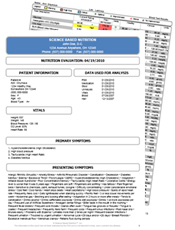For some time now, many of you have been asking about the safety of sucralose most commonly known as Splenda™. We are led to believe that the product can be ingested with little regard for potential side effects. Besides, it’s the weight loss we’re worried about…right? Artificial sweeteners have been the saviors of our ever-expanding waste lines…right? Well, let’s take a look at the data. If you look back, all other artificial sweeteners have been heavily marketed as products that will help you lose weight. Look around…does it look like Americans are winning the battle of bulge? In fact, since 1980, you will see that obesity rates and consumption of artificial sweeteners have both soared. So, what makes us think that Sucralose is going to make a difference?
Sucralose is produced by adding chlorine to sugar. Yes…chlorine. This involves chemically changing the structure of the sugar molecules. Any animal that eats chlorine (especially on a regular basis) is at risk of cancer. The Merk Manuel and OSHA 40 SARA 120 Hazardous Waste Handbook states that chlorine is a carcinogen and emergency procedures should be taken when exposed via swallowing, inhaling, or through the skin. If you already consume sucralose, will this be the only source of chlorine you are being exposed to? What about tap water [not just drinking it but taking showers and baths], swimming pools, steam rooms, etc.?
Research in animals has shown that sucralose can cause many problems in rats, mice, and rabbits, such as:
- Shrunken thymus glands (up to 40% shrinkage) (a gland that is the very foundation of our immune system)
- Swelling of the liver and kidneys.
- Calcification of the kidneys
- Reduced growth rate
- Decreased red blood cell count
- Hyperplasia of the pelvis
- Extension of the pregnancy period
- Aborted pregnancy
- Decreased fetal body weights and placental weights
- Diarrhea
The main issue is how few studies currently exist on sucralose. As of November 18, 2004 there were these many studies cited in the National Library of Medicine:
Saccharin: 3001 studies*
Aspartame: 774 studies*
Cyclamates: 653 studies*
Sucralose: 76 studies*
* Number of studies determined by MEDLINE search.
Most of those studies were on animals and few human studies of safety have been published on sucralose. One small study of diabetic patients using the sweetener showed a statistically significant increase in glycosylated hemoglobin (HgbA1c), which is a blood test used to monitor Diabetes. According to the FDA, “increases in glycosolation in hemoglobin imply lessening of control of diabetes”.
Something else to consider is that there are NO Long-term Human Research studies on sucralose. According to the Medical Letter on Drugs & Therapeutics, “Its long-term safety is unknown.”
The manufacturer would have you believe that sucralose is not absorbed and metabolized by the body. According to the FDA’s “Final Rule” report, 11% to 27% of sucralose is absorbed in humans, and the rest is excreted unchanged in feces. According to the Japanese Food Sanitation Council, as much as 40% of ingested sucralose is absorbed.
The pressing issue is understanding the fact that artificial sweeteners have not helped us keep our weight down. According to Consumers’ Research Magazine “There is no clear-cut evidence that sugar substitutes are useful in weight reduction. On the contrary, there is some evidence that these substances may stimulate appetite.”
Stop buying into the lie that artificial sweeteners: #1 will help you lose weight and #2 are safe for consumption. With no established system for monitoring and tracking post-approval adverse effects, how can it ever be established whether large-scale and long-term consumption of sucralose is safe? If you are continuing to consume sucralose and other artificial sweeteners, you are part of the grand experiment. But you don’t have to deny yourself all together. There are many other healthy and natural sweeteners you can easily use to replace the artificials and even white sugar!
Honey is a health-promoting sweetener. It keeps well and never spoils. Honey contains 2 different sugars…dextrose, which is assimilated very quickly, giving that “instant” boost of energy the body needs. It also contains levulose that is absorbed much more slowly and maintains the sugar level for some time. Honey’s double-action sugars quickly satisfy a craving for sweets and tend to maintain that sense of satisfaction for awhile. It also has anti-bacterial properties.
However, if you like the taste of an artificial sweetener, Stevia is the product for you. Stevia is an herb that has been used as a sweetener in South America for hundreds of years. After centuries of use in Paraguay, and decades in Japan, there has yet to be a complaint that Stevia, in any of its consumable forms, has produced any harmful side effects. For diabetics using artificial sweeteners, we recommend a gradual use of stevia. You can initially use stevia in some of your drinks, like coffee or tea. After a few weeks, as your comfort level with stevia increases, you can use more of the herbal extract. Stevia has not been shown to increase blood sugar levels, but because each individual’s condition is different — such experimentation should be done under the supervision of a qualified healthcare professional. There are many cookbooks available that can give you some great recipes to use with stevia.

